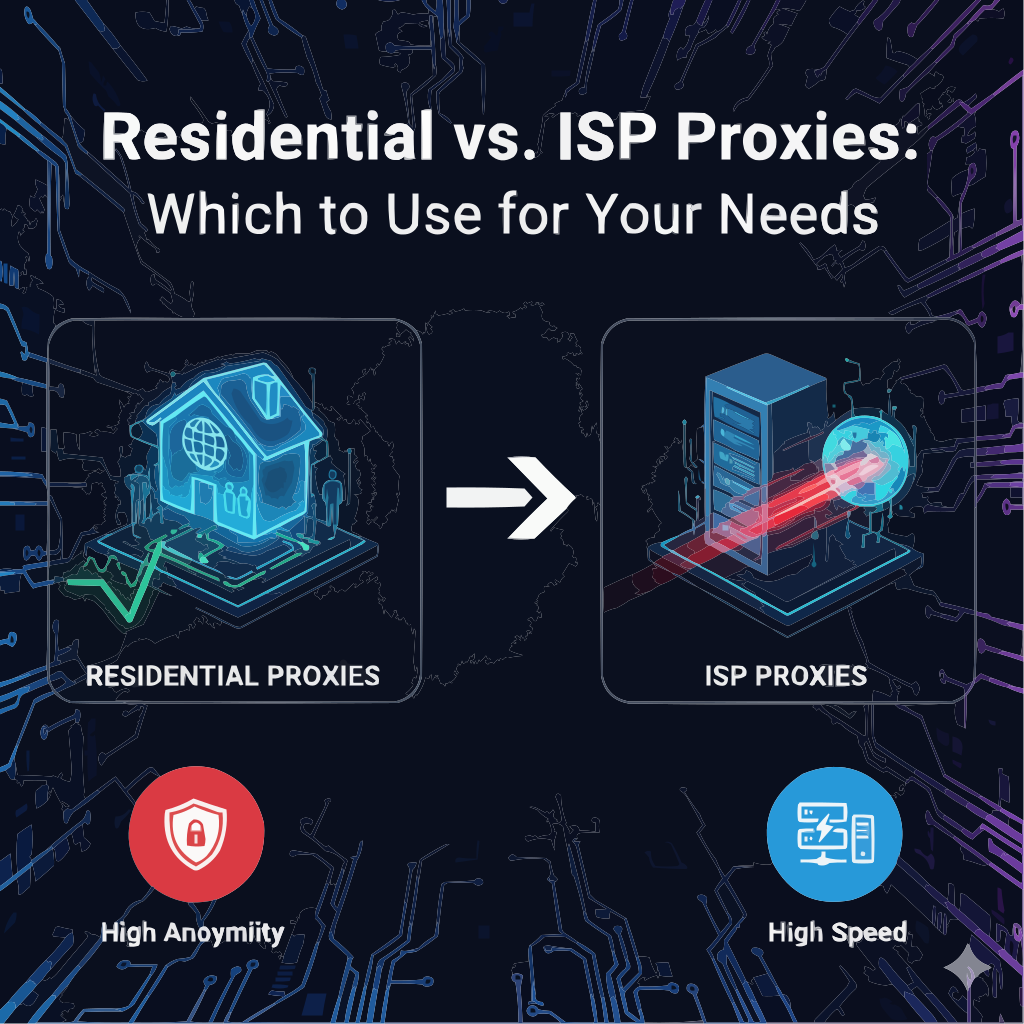Introduction
Choosing the right proxy service is crucial for tasks like web scraping, ad verification, or managing multiple accounts. While the world of proxies can seem complex, understanding the difference between the two main types—residential and ISP proxies—is key to success. This article will break down their features, pros, cons, and help you decide which is best for your specific needs.
Residential Proxies
Residential proxies use IP addresses from real internet users, assigned by an Internet Service Provider (ISP). When you use one, your traffic is routed through a device like a home computer or mobile phone.
Pros
- High Anonymity: Your traffic appears to originate from a real person’s device, making it very difficult for websites to detect and block.
- Superior Geotargeting: With a vast, global pool of IPs, residential proxies can target locations down to the city or even neighborhood level.
- Lower Ban Rate: They’re less likely to be flagged as bot traffic, which is ideal for platforms with sophisticated anti-bot systems like social media sites.
Cons
- Slower Speeds: Since traffic is routed through real residential connections, speeds can be slower and less stable.
- Higher Cost: Due to the complexity and infrastructure required to maintain a network of real user IPs, they are generally more expensive.
- Connection Instability: Their stability depends on the host device staying online, which can be inconsistent.
ISP Proxies (Static Residential Proxies)
ISP proxies are IP addresses provided by an ISP but are hosted in a high-performance data center. They combine the legitimacy of a residential IP with the speed and reliability of a data center.
Pros
- Faster Speeds & Reliability: Hosted on dedicated servers, they offer lightning-fast speeds and stable connections, which is crucial for time-sensitive tasks.
- Consistency: Their static nature means the IP doesn’t change, which is perfect for maintaining long sessions or managing accounts that require a consistent identity.
- Legitimacy: While hosted in data centers, their IPs are assigned by an ISP, making them appear as legitimate home or business connections to many websites.
Cons
- Lower Anonymity: While better than pure data center proxies, some sophisticated anti-bot systems can still detect that the IP is hosted in a data center.
- Limited IP Diversity: Their IP pools are smaller and less geographically diverse than residential proxies.
- Higher Price: They are often more expensive than both residential and data center proxies.
Head-to-Head Comparison
| Feature | Residential Proxies | ISP Proxies |
|---|---|---|
| IP Source | Real user devices | Data centers (but IP is from an ISP) |
| Speed | Medium (variable) | High (stable) |
| Anonymity | Highest | High |
| Use Cases | SEO research, ad verification, social media management, bypassing aggressive anti-bot systems | E-commerce, sneaker bots, long-term sessions, high-speed web scraping |
| Cost | Typically higher | Often more expensive than data center proxies but can be cheaper than residential for high-volume tasks |
| IP Rotation | Automatic | Manual or less frequent |
| Geo-Targeting | Very granular (city/region) | Limited (country/broad region) |
Conclusion
The choice between residential and ISP proxies depends entirely on your needs:
- Choose Residential Proxies if your top priorities are anonymity, geotargeting, and bypassing the most advanced anti-bot systems. They are perfect for tasks where mimicking real human behavior is paramount.
- Choose ISP Proxies if you need speed, stability, and consistent IPs for tasks like high-volume web scraping, botting, or managing accounts where connection consistency is more important than IP diversity.
Additional Resources
- Understanding Forward vs. Reverse Proxies
- Complete Guide to Proxy Server Types
- Proxy Server Architecture and Security
Found this comparison helpful? Share it with your fellow developers and let us know what you’d like to see next in the comments!


Comments
Comments
Comments are not currently enabled. You can enable them by configuring Disqus in your site settings.